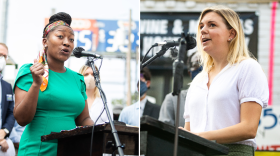Daniela Silva and José Velásquez are vying to take over for outgoing District 3 Council Member Pio Renteria on the Austin City Council.
The two are competing in a runoff election this month because they earned the most votes out of the six candidates who ran for the spot that represents part of East Austin in November — but neither candidate got more than the required 50% of votes.
In October, both candidates joined KUT and the Austin Monitor for a candidate forum. Here's a look at their positions on three major issues facing the district and Austin writ large.
Not sure if you live in District 3? To see what City Council district you're in, go here. Click “I Want To …" and "Find My Council District” and type in your address.
Affordable housing
In the November election, Austin voters overwhelmingly agreed to let the city borrow $350 million to put toward affordable housing. The move comes as housing costs in the city have risen at historic rates.
Daniela Silva endorsed the proposition but says this isn’t a one-size-fits-all issue. On top of that, she said the city’s attempts — and subsequent failures — to revamp its land development code will loom large in that decision-making process.
"[I support] that they are going to use the money to build deeply affordable housing, which oftentimes is a little trickier to build due to property reasons," she said.
José Velásquez has stated plainly that affordable housing — or the lack thereof — was an impetus in his decision to run for the D3 seat. The native Austinite said he “happily” endorses the plan and he hopes to bring more affordable housing to the district and throughout the city amid record inflation and a persistent affordability crisis.
"I am running because of the lack of urgency around affordability," he said. "We need more housing all across Austin. We needed it 10 years ago."
Homelessness
District 3 is home to The Other Ones Foundation’s Esperanza Community — a large-scale site for people transitioning out of homelessness. It’s a state-owned site that was reappropriated by Gov. Greg Abbott in 2019 amid escalating tensions between the City of Austin and the state’s GOP leadership.
The Other Ones Foundation has since taken over managing the site, and it’s one of several Austin nonprofits that’s worked both within and outside of the traditional funding model for providing homeless services to those in need.
Daniela Silva believes the city should better empower community organizations, nonprofits and mutual aid groups doing on-the-ground work. She said the city should reduce the “siloing” that happens between non-governmental and governmental organizations.
"I think the city can step in to help create a more tightly knit network of our resources that anyone can access," she said. "So, creating a citywide database that anyone can access either online or by calling either 311 or 211, whichever can be integrated more efficiently."
José Velásquez and Silva largely agree on the need for more coordination in the city’s response to homelessness, but Velásquez emphasized the need to focus on the housing-first model — a philosophy of getting as many people into housing as possible, then connecting them with health and social services.
"We need to make sure that anybody that's receiving city funding, that we can attach strings in order to remove barriers to housing," he said. "We need to … make sure that housing is affordable and move people in quickly."
Project Connect
The sprawling, $10 billion plan to build out two rail lines and expand bus service across the city will hit every district in Austin, development-wise — and it comes after decades of trying and failing to bring rail to Austin.
Capital Metro and the city have put an emphasis on equity-minded development, but the project's price tag has ballooned from an initial $6 billion budget to now a more than $10 billion estimated cost.
Daniela Silva said Austin’s public transit system isn’t the “fastest or most efficient or most reliable.” She said she hopes Project Connect will make the city a less car-reliant one for all Austinites — without sacrificing equitable investment in transit-dependent neighborhoods.
"I dream of an Austin where if you don't have to drive, then you don't have to own a car and you can get around everywhere — and it's not inconvenient or slow," she said.
José Velásquez says he believes Project Connect could reignite Austin’s appreciation and dependence on public transit, which could bode well for the city’s goals to reduce emissions through mass transit.
"I'm excited about Project Connect coming in because I think it'll lead to less congestion, less traffic and less of an assault on our environment," he said. "I'm excited about the city being more connected and … more frequent routes and different routes around the city."
You can watch the entire pre-runoff District 3 debate hosted by KUT and the Austin Monitor below.
Early voting has begun and runs through Dec. 9. Election Day for runoffs is Dec. 13.













